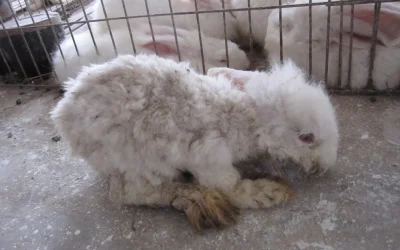Blog
Watch Seaspiracy to learn more about why increased sea life consumption is a terrible idea.
The strategy followed a 2021 comprehensive National Food Strategy review of the UK food system led by Henry Dimbleby, co-founder of Leon, a non-vegan UK restaurant chain. On the advisory panel of the review, which claimed to be independent, were Minette Batters, President of the National Farmers Union and owner of a farm which boasts of owning over 100 cows as well as sheep, Andrew Selley, CEO of Bidcorp, a food distribution business servicing KFC, Pizza Hut, Taco Bell, Burger King, Nandos and Pizza Express, Sebastian Munden, the General Manager of Unilever, and Roger Whiteside, the CEO of Greggs, a non-vegan UK bakery chain. The team of experts on the review team also included Susan Jebb who last year stated “Although animals produce emissions, they are an important part of our agriculture ecosystems and provide important nutrients.”
It is unclear how a panel composed of people with such clear vested interests could be independent. It is therefore of no surprise that the strategy contradicts itself and is full of mixed messaging. It is far from a new green plant-based vision to combat the climate crisis, improve peoples’ health and end the exploitation and murder of animals, which is so urgently needed.
While the new strategy did call for schools, prisons, and hospitals to offer a vegan option as mandatory, which is a welcome move in the right direction, it also took several moves in the wrong direction by aiming to increase demand for the seafood sector. Prime Minister Johnson said the UK government will invest GBP 24 million (USD 30.1 million, EUR 28.1 million) to support the plan’s call for seafood-related research and innovation, as part of the GBP 100 million (USD 125.5 million, EUR 117.1 million) UK Seafood Fund. This fund also allocates at least GBP 65 million (USD 81.6 million, EUR 76.1 million) for infrastructure investments, including port improvements and refurbishment of aquaculture and seafood-processing facilities. Perhaps no one on the advisory board or the government has seen Seaspiracy, or else they’d know the horrendously damaging effects fishing has on the oceans, environment and of course the fishes themselves.
There is also encouragement in the report for people to shift towards “responsibly sourced wild venison” instead of ‘beef’ and to open a consultation about new technologies to help cows produce less methane. In addition, there is a focus on regenerative animal farming, which uses more land than intensive farming. The report claims “sustainable sources of protein do not have to be new or novel or displace traditional sectors. Regenerative farming will also provide a more sustainable production of traditional protein sources. Using ‘livestock’ to benefit the environment in balance with food production is already being championed by many small-scale farmers.”
Animal agriculture dominates the landscape at home and abroad

Fig 9.3 taken from page 90 of Henry Dimbleby’s 2021 National Food Strategy: The Plan.
Globally animal farming takes up 83% of the world’s agricultural land, but delivers only 18% of our calories. With a shift to a plant-based food system there would be opportunity to restore ecosystem services such as CO2 sequestration, which can mitigate further contributions to climate change through restoring and reinstating carbon sinks.
This is counterproductive and ignores the fact that animal agriculture is a major contributor to the climate crisis. The three main greenhouse gases — carbon dioxide, methane, and nitrous oxide are at record levels and rapidly accelerating; animal agriculture contributes to all three but is the main driver of methane and nitrous oxide emissions globally. “Animal agriculture is responsible for around 66% of all food’s annual emissions, yet provides only 18% of calories.” (Johan Falk)
Other measures being put forward include recommendations to reduce meat intake by 30%, increasing fruit and vegetable intake by 30%, and fiber intake by 50%. The plan will aim to make it more straightforward to convert land into farms, ensure that poultry workers will be eligible for seasonal migrant visas, make it easier for countries with strong ‘animal welfare legislation’ to trade animals with the UK, aim to reduce food waste, and hopes to tackle obesity.

Fig 1.1 and 1.2 from page 16 of Henry Dimbleby’s 2021 National Food Strategy: The Plan.
Wrong Direction
While the new strategy did call for schools, prisons, and hospitals to offer a vegan option as mandatory, which is a welcome move in the right direction, it also took several moves in the wrong direction by aiming to increase demand for the seafood sector. Prime Minister Johnson said the UK government will invest GBP 24 million (USD 30.1 million, EUR 28.1 million) to support the plan’s call for seafood-related research and innovation, as part of the GBP 100 million (USD 125.5 million, EUR 117.1 million) UK Seafood Fund. This fund also allocates at least GBP 65 million (USD 81.6 million, EUR 76.1 million) for infrastructure investments, including port improvements and refurbishment of aquaculture and seafood-processing facilities. Perhaps no one on the advisory board or the government has seen Seaspiracy, or else they’d know the horrendously damaging effects fishing has on the oceans, environment and of course the fishes themselves.
There is also encouragement in the report for people to shift towards “responsibly sourced wild venison” instead of ‘beef’ and to open a consultation about new technologies to help cows produce less methane. In addition, there is a focus on regenerative animal farming, which uses more land than intensive farming. The report claims “sustainable sources of protein do not have to be new or novel or displace traditional sectors. Regenerative farming will also provide a more sustainable production of traditional protein sources. Using ‘livestock’ to benefit the environment in balance with food production is already being championed by many small-scale farmers.”
This is counterproductive and ignores the fact that animal agriculture is a major contributor to the climate crisis. The three main greenhouse gases — carbon dioxide, methane, and nitrous oxide are at record levels and rapidly accelerating; animal agriculture contributes to all three but is the main driver of methane and nitrous oxide emissions globally. “Animal agriculture is responsible for around 66% of all food’s annual emissions, yet provides only 18% of calories.” (Johan Falk)
Other measures being put forward include recommendations to reduce meat intake by 30%, increasing fruit and vegetable intake by 30%, and fiber intake by 50%. The plan will aim to make it more straightforward to convert land into farms, ensure that poultry workers will be eligible for seasonal migrant visas, make it easier for countries with strong ‘animal welfare legislation’ to trade animals with the UK, aim to reduce food waste, and hopes to tackle obesity.
Criticism
The UK government has already been criticized for not doing enough after the unveiling of the new strategy, including by Henry Dimbleby who led the review. Dimbleby has suggested expanding free school meals, introducing a salt and sugar tax, and a 30 per cent reduction in meat and dairy consumption, not just meat consumption which he says is necessary to ensure the UK meets its commitment to bring all greenhouse gas emissions to net zero by 2050.
The National Library of Medicine in their 2017 journal ‘A plant-based diet for overweight and obesity prevention and treatment’ concluded that individuals consuming plant-based diets tend to have a lower BMI than those consuming non-plant-based diets, the adoption of plant-based diets also appears effective for weight loss and that, plant-based diets should be considered a viable option for patients who are interested in losing weight and improving dietary quality consistent with chronic disease prevention and treatment. Given this, and countless other studies showing the benefits of a plant-based diet in fighting obesity and diabetes, it is unclear why the UK government opted to suggest increasing non-vegan food consumption at all and only suggested reducing meat intake by 30%.
The Vegan Society’s Head of Department, Claire Ogley, shared: “The government’s watered-down National Food Strategy for England Policy Paper falls worryingly short of the ambitions set out in the independent review last year and is hard to swallow. We urgently need a radical whole system change to our diets in order to avert climate catastrophe.”
Ogley added: “The government has ignored recommendations from its own experts to set a target for reducing the consumption of meat and dairy, despite the undeniable links between animal farming and environmental damage.” Rob Percival, head of food policy at the Soil Association, made similar comments “they’re allowing unsustainable diets to continue, and they’re exacerbating the ecological crisis.”
The report also highlighted how sustainable and alternative proteins could play a major role in food production moving forward, and the final food strategy announced a £120 million investment into research in this area. However, this was labeled a disappointment and a missed opportunity by industry leaders in the alternative protein industry who were hoping for a more ambitious plan and investment.
Labour, the political party in opposition to the Conservative government in the UK branded the strategy as bordering on preposterous, with shadow environment secretary Jim McMahon saying: “This is nothing more than a statement of vague intentions, not the concrete proposals to tackle the major issues facing our country.
Business as usual is not an option
This new food strategy is a massive missed opportunity for the UK government to bring about much needed and urgent change. We urgently need to act on the available science to implement immediate changes to our food strategy in order to actively address the escalating climate crisis. We need to implement a Plant Based Treaty that puts a plant-based solution at the forefront of both conversation and policy.
Modeled on the popular Fossil Fuel Treaty, the Plant Based Treaty aims to halt the widespread degradation of critical ecosystems caused by animal agriculture and to promote a shift to healthier, sustainable plant-based diets.
The UK government needs to revisit its food strategy, appoint a truly independent review team, expand plant based options to 50% of menus by 2025 and debate the Plant Based Treaty in Parliament as a matter of urgency. The Plant Based Treaty has three simple demands; Relinquish: Stop the problem increasing, no land use change including deforestation for animal agriculture, Redirect: Eliminate the driving forces behind the problem, a promotion of plant-based foods and actively transition away from animal-based food systems to plant-based systems and Restore: Actively healing the problem while building resilience and mitigating climate change by restoring key ecosystems and reforest the earth.
These simple but effective measures will make both instant and long lasting change. They will begin to halt the catastrophic direction our climate is heading for, immediately benefit people’s health, and end the unnecessary and horrific abuse and killing of animals.

Source: United Nations Environment Programme and Climate and Clean Air Coalition (2021). Global Methane Assessment: Benefits and Coats of Mitigating Methane Emissions.
“Ethically, all unnecessary methane sources have to be cut as fast and far as feasible. That means global veganization is now a survival imperative.” – Dr Peter Carter, IPCC expert reviewer.

James O'Toole is a director of communications covering media relations, petitions, newsletters and celebrity activism. Previously James worked in the finance industry as a stockbroker and wrote market commentary.

James O’Toole is a director of communications covering media relations, petitions, newsletters and celebrity activism. Previously James worked in the finance industry as a stockbroker and wrote market commentary.
More from the blog
Canadian Plant-Based Nutrition And Lifestyle Medicine Conference – Introduction To Blog Series On Diet Change
By Miriam Porter
7 Reasons Never To Wear Angora
By Miriam Porter
Inspiring change towards a more vegan supply
By Nilgün Engin



